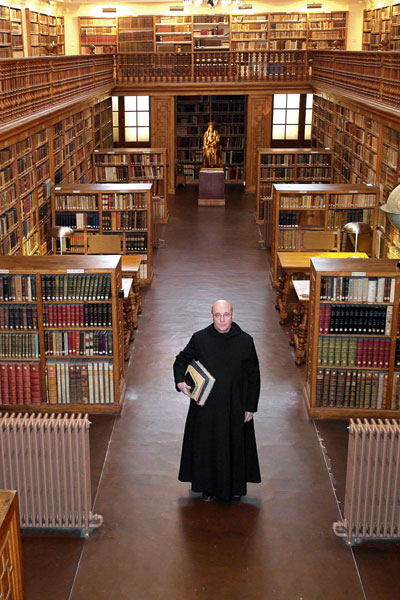‘Don’t be evil.’ Google’s unofficial motto.
‘Evil men don’t get up in the morning saying, “I’m going to do evil.” They say, “I’m going to make the world a better place.”’ Christopher Booker.
Meanwhile — while you were distracted by other things like tax bills and school fees and somehow scraping by — Google and Amazon and Apple took over the world. This, of course, is what novels by the likes of William Gibson, films such as Blade Runner and comic strips like Judge Dredd have been telling us for some time: that one day, the world will be ruled not by governments but by giant corporations. What I don’t think many of us realised — I certainly didn’t — was that such a thing was going to happen in our lifetime.
But then I watched Ben Lewis’s glacial but rewarding Storyville documentary Google and the World Brain (BBC4, Monday) and my eyes were opened. What Google has been trying to do — in all our best interests, apparently — is very, very scary. And the thing that’s so scary is precisely this: that Google cannot see — or claims to be unable to see — that it has been doing anything wrong.
Google’s plan went something like this: with the permission of the world’s greatest libraries — from Harvard and the Bodleian to the 11th-century Monastery of Montserrat in Spain — it would scan the pages of all the books ever written. These would then be made available for free access at all the world’s public libraries, thus treating all mankind to the gift of knowledge.
But there was at least one problem with this. Out of the ten million books Google has scanned so far, six million are still under copyright. What Google was doing, in other words, was stealing six million properties — and expecting no one to mind, either because the theft was on such a massive scale that it almost defied comprehension or because the project was costing so much money that everyone would somehow applaud Google’s altruism.
It took a German to point out the obvious. ‘I could go into Deutsche Bank and remove all the money and hand it out to all the people in the street. “Look, I have helped unemployment. There are no beggars any more,” I might say. But it would still be a bank robbery,’ said an engaging fellow named Roland Reuss, professor of literature at Heidelberg.
Normally, when it’s a competition between fusty, sclerotic Old Europe and go-ahead, can-do America I’m with the US all the way. Not on this occasion, however. I particularly warmed to a character so ludicrously Gallic and Grande Ecole I’m surprised they didn’t film him with a napkin over his head devouring an ortolan. His name was Jean-Noël Jeanneney, former director of the French National Library.
Jeanneney was not impressed when the young men from Google approached him. He could tell they were not habituated to wearing ties, he said, and had clearly only put one on because such, they believed, was the European way. Worse, they made the fatal mistake of attempting to curry favour with a gift: they had brought him one of those thermos mugs that keeps your hot drinks warm on train journeys. He had resolved then and there to have nothing to do with Google and its infernal project.
Of course, there were other talking heads on hand — the co-founder of Wired, for example — to tell us that we were all making a huge mistake, that objecting to Google’s plan was essentially Luddite and that people who didn’t like the way progress was going should just give up their computers and go and live in the hills.
It seems to me, though, that this ‘you don’t understand technology’ defence is not only arrogant but specious, too. There’s a reason why we have monopoly regulations and it’s precisely to stop the kind of dangerous concentration of power that would have given Google — had not its scheme been thwarted by a US judge after a case brought by the Authors Guild — a stranglehold over all the best things that had ever been thought or written, to exploit this as it wished.
‘What is a company doing with all this information?’ one commentator asked. What indeed. It’s said that Google’s ultimate goal is to create a form of Artificial Intelligence, a search engine so amazing that it can answer in an instant almost every question you ever dreamed of asking. Already, we are well on the way to achieving this. An IBM supercomputer called Watson recently beat its human rivals to win the US quiz show Jeopardy: to do this, it not only had to be capable of sifting 200 million pages of data to find the right answer (or rather, in Jeopardy’s case, question) but also to understand colloquial speech and metaphor. By 2045, one expert reckoned, our computing technologies will have expanded a billionfold — and we’ll be able to access all knowledge from an implant in our bodies no bigger than a blood cell.
Bugger. Does that mean the money I spend on school fees is completely wasted, then?






Comments